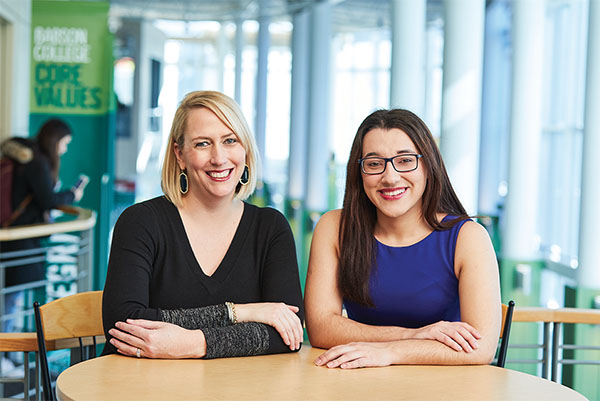
Photo: Pat Piasecki
Beth Wynstra (left), assistant professor of English, and Global Scholar Larissa Moreira ’20
During her first semester at Babson, Larissa Moreira ’20 felt homesick as Thanksgiving break approached. “It’s a family time,” she says. “I saw everyone leaving for home, and I wanted to go home, too. But it’s too far away.”
Home for Moreira is Brazil. A Babson Global Scholar, she comes from the industrial city of Betim, located in the southeastern part of the country, some 4,600 miles from Babson Park. Luckily for Moreira, though, she also has an adopted family much closer to campus. She is a participant in the Global Scholars Host Program, which matches scholars with a staff or faculty member as a way to help students transition to life in the U.S.
Moreira was matched with Beth Wynstra, assistant professor of English. For Thanksgiving, Wynstra invited Moreira into her home, where the student shared turkey, mashed potatoes, and conversation with Wynstra’s family and friends. “I am thankful she opened her life and family to me,” says Moreira. “I really wanted to be part of a family here.”
Launched in 2014, the Global Scholars Program provides need-based scholarships for highly talented international students. Matching students with hosts began in 2015 after program directors realized that some scholars were having trouble adjusting to school and life in America. Since then, 16 matches have been made, and any Babson faculty or staff member is eligible to be a host, says Jamie Kendrioski, director of international services and multicultural education.
Participating faculty and staff are asked to stay in regular contact with their students and meet with them monthly for an activity. Boating trips, apple picking, Christmas tree shopping, and Halloween parties are examples of activities that hosts have organized, though Kendrioski says students most appreciate simple dinners in the host’s home. “That’s what students love the most, to experience U.S. home life in a relaxed family setting,” he says.
Of course, students aren’t the only ones who benefit from the program. Faculty and staff have the opportunity to form a close relationship with someone from a culture much different from their own. “I think so many of us who work in higher ed want a deeper connection to students,” Kendrioski says. “That’s why we’re here.”
Wynstra and Moreira have spent a lot of time together. They’ve visited Walden Pond, gone to restaurants and campus events, and taken in productions of The Empty Space Theater, of which Wynstra is the founding artistic director. Wynstra says that she has enjoyed learning about Brazil and hearing about Moreira’s family, but even more she is inspired by the student. Not only is Moreira making her way in a place far from home, but she also is running a venture that she co-founded. That venture, InspiraSonho (“Inspire Dream” in Portuguese), is a platform that posts scholarships, competitions, and learning opportunities for high school students. “I know being a student and keeping that business going is not easy,” Wynstra says. “She is really thriving. I am deeply inspired by her.”
The initial commitment to the host program is for a year, but many matches stay in touch beyond the program’s end. Now in her sophomore year, Moreira no longer needs as much support as she did her first year, but she and Wynstra continue to chat and get together. “We created a relationship,” Moreira says. “I really enjoy the time we spend together.”—John Crawford
